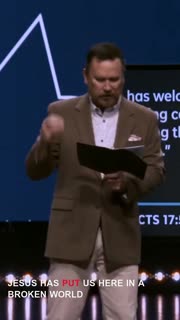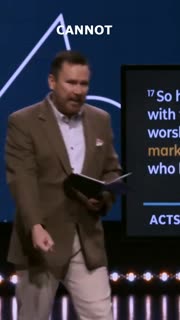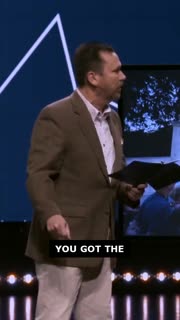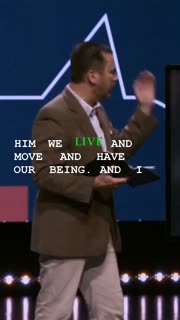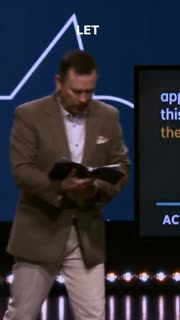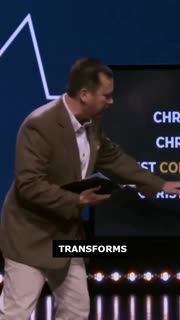Taking Jesus to the World: Paul's Blueprint
Devotional
Sermon Summary
Bible Study Guide
Sermon Clips
1. "Caesar is not Lord. It doesn't matter if it's a Democrat Caesar or a Republican Caesar. Caesar is not Lord. Jesus is Lord. You say, so what are we to do in an election year? You be a good Christian citizen. You register to vote. You go and vote. And that started on the 20th here in this state. All right, so you've got a long time. And then you register. You go vote. And remember, regardless of who wins, our allegiance is to Jesus because he's Lord." [49:26] (43 seconds)
2. "Jesus has put us here in a broken world so that we can turn it right side up. So that where there's darkness, we bring light. And where there's hatred, we bring love. And where there's a frown, we bring a smile. And where there's loneliness, we bring community. And where there's chaos, we bring order and leadership. And where there's bondage and addiction, we bring freedom. Where there's death, we bring life. Why? We're taking Jesus, the living Lord Jesus, to the world." [50:07] (29 seconds)
3. "Our faith cannot be confined to these walls. Our faith cannot be confined. Christianity can't be confined to a campus. No, we got to take Jesus to the marketplace. And notice the emphasis is on every day. Every day. Every day. Every day. What do you do? Pick up here in verse 10. As soon as it was night, the brothers and sisters set Paul and Silas away from Thessalonica to Berea." [50:44] (25 seconds)
4. "You got the Holy Spirit living inside of you. Every day you spend time in his word. Every day you take Jesus to the marketplace. Daily. Everybody say daily. You know what that means? It's not just church. Come on, you preach it. It's not just church. It's life. It's in the marketplace. It's the people you meet in the grocery store or at the pharmacy or at the gas station. It's the waiter or waitress you're going to talk to today in the restaurant. It's the people that get on that elevator with you." [52:40] (31 seconds)
5. "Leadership is influence. It's influence. And what I'm talking about is leadership. What I'm talking about is every day in the marketplace, gospel influencers. In the world of business, the world of politics, the world of media, sports, education, law. I want to be known as a place that's a launching pad. Yes, we count attendance. Thank God for all those who come in attendance. But what about ascendance? S-E-N-D. It's not just our seating capacity. It's our sending capacity." [57:00] (33 seconds)
6. "In him we live and move and have our being. And I preached that at the foot of Mars Hill. And Tammy was. She was a back row Baptist that day. She was back on the very back sitting on the rock there at Mars Hill. And as sure as I stand here, as I'm preaching. Now listen. As I'm preaching, the police came up and tried to interrupt it. We were at the foot of the hill. It looked like the whole world was passing by." [01:06:51] (25 seconds)
7. "I'm just telling you. That's why your Saturday night's not matching up with your Sunday morning. He's Lord of all. Christianity is not a way of looking at certain things. It is a certain way of looking at everything. And you can't compartmentalize your life like this. And we bought into this sacred, secular split if it's a two-story house like the White House. And up here is your private life and down here is your public life." [01:12:56] (29 seconds)
8. "Christianity really does answer the philosophical questions better than any other world view. I'm just telling you, the structure of everything God made is good. The direction is wrong. The world's just headed in the wrong direction. And Jesus said, I want you to come back home. I want you to come back to me. And that's exactly what he's saying to you today." [01:14:56] (23 seconds)
9. "Let me just tell you. Not only do you know deep down in your heart there's a God. You look at every other world religion. Moses is dead. Muhammad is dead. Buddha is dead. Let me tell you why I'm a Christian. Jesus. Jesus. Jesus is alive. Jesus is alive. And I want you to see, Paul gives us a model for how to take Jesus to the world in the secular world in which we live right now." [01:10:35] (31 seconds)
10. "Christ transforms culture. He wants us in a world of darkness to bring light and a world of hatred to bring love. He came to restore, redeem everything that the first Adam lost. And so here it is. We live in a beautiful world that God's created. It's just broken by sin. And it's got to be restored. And I love what Francis Schaeffer said. He said, because we're beings who have the power of choice, the cause that created us must have a will." [01:13:56] (34 seconds)
Ask a question about this sermon
2. "Jesus has put us here in a broken world so that we can turn it right side up. So that where there's darkness, we bring light. And where there's hatred, we bring love. And where there's a frown, we bring a smile. And where there's loneliness, we bring community. And where there's chaos, we bring order and leadership. And where there's bondage and addiction, we bring freedom. Where there's death, we bring life. Why? We're taking Jesus, the living Lord Jesus, to the world." [50:07] (29 seconds)
3. "Our faith cannot be confined to these walls. Our faith cannot be confined. Christianity can't be confined to a campus. No, we got to take Jesus to the marketplace. And notice the emphasis is on every day. Every day. Every day. Every day. What do you do? Pick up here in verse 10. As soon as it was night, the brothers and sisters set Paul and Silas away from Thessalonica to Berea." [50:44] (25 seconds)
4. "You got the Holy Spirit living inside of you. Every day you spend time in his word. Every day you take Jesus to the marketplace. Daily. Everybody say daily. You know what that means? It's not just church. Come on, you preach it. It's not just church. It's life. It's in the marketplace. It's the people you meet in the grocery store or at the pharmacy or at the gas station. It's the waiter or waitress you're going to talk to today in the restaurant. It's the people that get on that elevator with you." [52:40] (31 seconds)
5. "Leadership is influence. It's influence. And what I'm talking about is leadership. What I'm talking about is every day in the marketplace, gospel influencers. In the world of business, the world of politics, the world of media, sports, education, law. I want to be known as a place that's a launching pad. Yes, we count attendance. Thank God for all those who come in attendance. But what about ascendance? S-E-N-D. It's not just our seating capacity. It's our sending capacity." [57:00] (33 seconds)
6. "In him we live and move and have our being. And I preached that at the foot of Mars Hill. And Tammy was. She was a back row Baptist that day. She was back on the very back sitting on the rock there at Mars Hill. And as sure as I stand here, as I'm preaching. Now listen. As I'm preaching, the police came up and tried to interrupt it. We were at the foot of the hill. It looked like the whole world was passing by." [01:06:51] (25 seconds)
7. "I'm just telling you. That's why your Saturday night's not matching up with your Sunday morning. He's Lord of all. Christianity is not a way of looking at certain things. It is a certain way of looking at everything. And you can't compartmentalize your life like this. And we bought into this sacred, secular split if it's a two-story house like the White House. And up here is your private life and down here is your public life." [01:12:56] (29 seconds)
8. "Christianity really does answer the philosophical questions better than any other world view. I'm just telling you, the structure of everything God made is good. The direction is wrong. The world's just headed in the wrong direction. And Jesus said, I want you to come back home. I want you to come back to me. And that's exactly what he's saying to you today." [01:14:56] (23 seconds)
9. "Let me just tell you. Not only do you know deep down in your heart there's a God. You look at every other world religion. Moses is dead. Muhammad is dead. Buddha is dead. Let me tell you why I'm a Christian. Jesus. Jesus. Jesus is alive. Jesus is alive. And I want you to see, Paul gives us a model for how to take Jesus to the world in the secular world in which we live right now." [01:10:35] (31 seconds)
10. "Christ transforms culture. He wants us in a world of darkness to bring light and a world of hatred to bring love. He came to restore, redeem everything that the first Adam lost. And so here it is. We live in a beautiful world that God's created. It's just broken by sin. And it's got to be restored. And I love what Francis Schaeffer said. He said, because we're beings who have the power of choice, the cause that created us must have a will." [01:13:56] (34 seconds)

